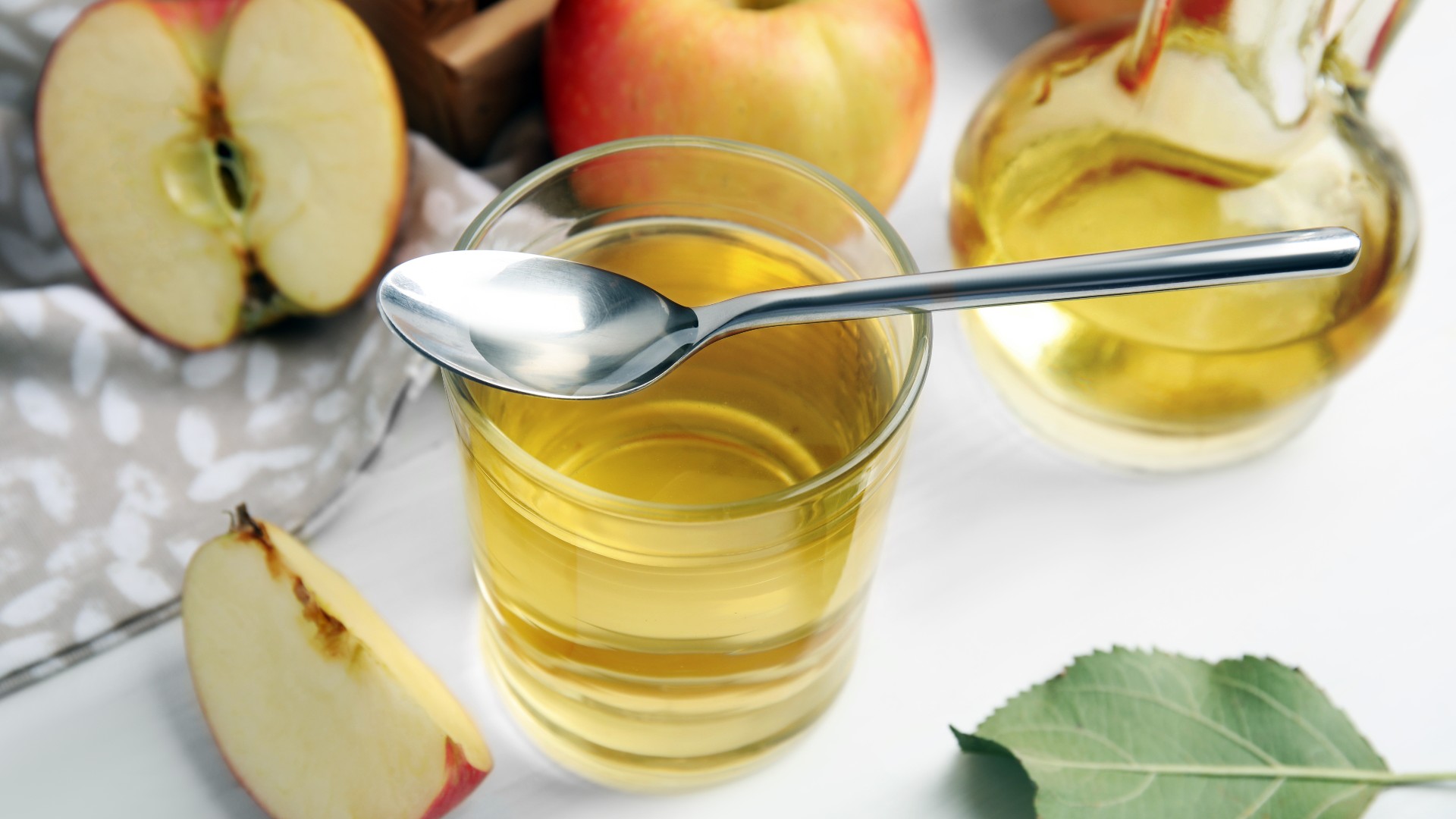
We see so many celebrity trends floating around on social media, and drinking apple cider vinegar isn’t exactly new. But ever the curious journalist, I decided to find out if there's anything to the growing health trend.
Victoria Beckham posted on her Instagram Stories that she takes several tablespoons of apple cider vinegar every morning without fail, and other celebs like Kim Kardashian and Katy Perry have also reportedly taken to sipping the cider vinegar as a daily ritual. It’s considered to be a powerhouse of health benefits, from aiding weight loss and digestion to improving your skin and protecting your gut health.
Keen to give it a try, I decided to drink two tablespoons of apple cider vinegar every morning for 10 days to see what (if anything) happened to my body, sometimes taking it on my morning walk with the dog using one of the best water bottles.
Before jumping in, I want to clarify that we don’t encourage food fads at Tom’s Guide, and we spoke to a qualified dietician while digging into the perceived health benefits and whether they ring true.
What works for my body might not work for you, so we recommend exercising caution if you plan to give it a try. If you have any existing health conditions, some reports say drinking apple cider vinegar neat could cause a reaction. The celebrity trends just keep coming, don’t they? And on that note, off I went in search of apple cider vinegar. Here’s what happened.
What are the benefits of drinking apple cider vinegar?
Drinking apple cider vinegar (ACV) has long been associated with being antioxidant and anti-inflammatory, aiding weight loss, curbing appetite and improving insulin sensitivity, helping to control blood sugar and diabetes.
ACV has also been touted for protecting gut health, lowering cholesterol levels and reducing muscle cramps during or after workouts, even increasing energy levels in some people.
Sign up to get the BEST of Tom's Guide direct to your inbox.
Get instant access to breaking news, the hottest reviews, great deals and helpful tips.
However, the research is mixed and limited. The Mayo Clinic says, “Proponents of apple cider vinegar claim that it has numerous health benefits and that drinking a small amount or taking a supplement before meals helps curb appetite and burn fat…there's little scientific support for these claims.” The existing studies into apple cider vinegar for weight loss haven’t been significant or consistent, and it could carry risks.
We spoke to elite sports dietician Nigel Mitchell, who tells us that apple cider vinegar is the result of a two-stage fermentation to produce alcohol (cider) and acetic acid (vinegar). Apple cider is highly acidic, and the Mayo Clinic claims it could irritate your throat “if you drink it often or in large amounts.” It could also interact with diuretics and insulin and other drugs.
Yikes. So, do any studies support drinking apple cider vinegar? Here’s what I learned.
I drank apple cider vinegar every day for 10 days — here's what happened

According to my research, most studies recommend starting small with no more than two tablespoons of ACV a day, diluted with water, lemon or herbal teas to protect your tooth enamel and oesophagus from its acidity (not worrying at all), so I mixed mine with a large glass of hot water and a squeeze of lemon and got drinking.
My mouth felt cleaner
Weird one, right? But there’s something to it. When digging into the best time to drink apple cider vinegar, many prefer the morning before you’ve eaten anything. Reportedly, it freshens the breath and boosts the digestive system.
One clinical trial study found that the antimicrobial properties of ACV could kill bacteria in the mouth and reduce plaque build-up. And some research suggests that ACV contains traces of pectin (a soluble fiber that apples are rich in). Pectin reportedly acts as a gentle laxative, but there’s a lack of evidence to back up the effectiveness of ACV in this arena.
I got used to the taste
Granted, it doesn’t beat a strong cup of coffee in the taste department, but I began looking forward to my morning ritual. If you don’t enjoy the taste — boy, is it strong — squeezing some fresh lemon juice into your cup or adding ACV to herbal tea can make it more enjoyable. Our writer drank lemon water every day for 2 weeks — here’s what happened and the health benefits of enjoying lemon.
I felt just as hungry
Sadly, I still had my eye on my partner's home-baked apple pie sitting in the fridge at home. It didn’t look, smell, or taste any less appealing following a morning ritual of supping apple cider vinegar.
One review of short-term studies found that those who consumed ACV with a meal experienced reduced appetite for up to 120 minutes afterward and snacked less for up to 24 hours after consumption. Sadly, my stomach must have missed the memo.
It didn't help my skin
I wasn't expecting much dermatologically — my editor drank a gallon of water a day for a month and didn't see a difference either.
One perceived benefit of drinking apple cider vinegar is that it helps clear bad skin. According to the National Eczema Organization, ACV could help. The organization says, “People with eczema typically have higher pH levels than those without…the skin barrier doesn’t function as it should.”
That means the skin’s microbiota (a guard against “bad” bacteria) can break down and expose the skin to harm. As ACV “is a mild acid,” those with eczema “theorize that applying ACV topically may help restore their skin’s natural pH level.”
I didn’t notice much difference in my skin, although I usually break out in spots around this time in my menstrual cycle, which I seem to have avoided this time around — that could also be a coincidence.
My system felt energized
I couldn’t put my finger on it, but I felt better in the mornings. Equally, this could have been a placebo effect from deep diving into studies and research, but my stomach felt more settled, and I experienced less of the morning bloat.
According to Science Direct, quality brands may contain amino acids and antioxidants, and ACV could have antidiabetic effects and help lower the levels of “bad” cholesterol (LDLs) in the blood. Unfiltered apple cider vinegar contains “mother,” the cloudy bit at the bottom of the bottle — the pure, raw part that contains good bacteria and enzymes, similar to a prebiotic. ACV purists say it’s a powerhouse of antioxidants and helps promote healthy gut flora.
Even for a limited time, my system felt more settled.
I drank apple cider vinegar every day for 10 days — here’s my verdict
It wasn’t a life-changing 10 days for me. And no shock there — it’s unlikely a daily shot of apple cider vinegar could be a cure-all for anyone.
That said, some research has been interesting to read, mostly around blood sugar and muscle cramping. One 2019 clinical trial shows that ACV consumption could improve the glycaemic index and oxidative stress of people with diabetes, and another study found vinegar could lower blood sugar levels after meals and improve insulin function. A piece of research into muscle recovery found that potassium-rich ACV could improve leg cramps and aid muscle relaxation in athletes due to the acetic acid!
Sadly, I still had my eye on my partner's home-baked apple pie sitting in the fridge at home. It didn’t look, smell, or taste any less appealing following a morning ritual of supping apple cider vinegar.
I can hold up my hands and say that 10 days may not be long enough to witness miraculous change, but I didn’t report many noticeable short-term improvements. I felt slightly less bloated in the morning, and my system felt temporarily “cleaner,” but it didn’t change my appetite, mood, or digestive system or impact my muscles. I had fun experimenting with it, but I’ll stick to my morning coffee for now, I think.
Nigel Mitchell is an elite sports dietitian who boasts a 20+ year career in supporting athletes nutritionally. Nigel has previously worked with top athletes from the world of British sports including Chris Froome and the Brownlee Brothers. He’s also one of the American Pistachio Growers' top nutrition experts.
More from Tom's Guide

Sam Hopes is a level 3 qualified trainer, level 2 reiki practitioner and senior fitness writer at Tom's Guide. She is also currently undertaking her Yoga For Athletes training course. Sam has written for various fitness brands and websites over the years and has experience across brands at Future such as Live Science, Fit&Well, Coach, and T3.
Having worked with fitness studios like F45 and Virgin Active, Sam now primarily teaches outdoor bootcamps, bodyweight, calisthenics and kettlebells. She also coaches mobility and stretching-focused classes several times a week and believes that true strength comes from a holistic approach to training your body.
Sam has completed two mixed doubles Hyrox competitions in London and the Netherlands and finished her first doubles attempt in 1:11.
